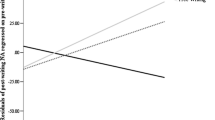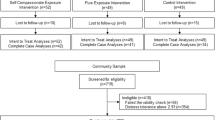Abstract
The present study investigated whether cultivating self-compassion facilitates disclosure of self-esteem threatening experiences to others, and whether it does so indirectly by reducing shame. Eighty-five female undergraduates recalled an event that threatened their self-esteem and were randomly assigned to write about it in a self-compassionate (n = 29), self-esteem enhancing (n = 30), or non-directive (free writing; n = 26) way. Participants then learned that self-disclosure can decrease distress and were invited to share their event in writing to a stranger. Contrary to the central hypothesis, there was no main effect of condition on self-disclosure; however, post hoc analyses demonstrated that condition interacted with self-esteem threat to predict length and depth of disclosure. For participants whose events were more self-esteem threatening, cultivating either self-compassion or self-esteem promoted deeper disclosures than free writing, and self-compassionate writing alone fostered longer disclosures. For less self-esteem threatening events, free writing promoted deeper and longer disclosures than cultivating self-compassion or self-esteem. Shame was not a significant mediator. Results highlight the potential utility of self-compassion or self-esteem enhancing interventions for facilitating the disclosure of distressing events that threaten self-worth.



Similar content being viewed by others
Data Availability
The datasets generated during and/or analysed during the current study are available from the corresponding author upon request.
Notes
A previously published article on this sample investigated the role of self-compassion in reducing the link between fears of compassion and perceived risks of disclosure (Dupasquier et al. 2018). In contrast, the present study examined the impact of self-compassion on actual disclosure for self-esteem threatening events and the role of a potential mediator (shame).
References
Arbuckle, J. L. (2013). Amos (Version 22.0). Chicago, IL: IBM Corporation.
Arimitsu, K., & Hofmann, S. G. (2016). Effects of compassionate thinking on negative emotions. Cognition and Emotion,31, 160–167. https://doi.org/10.1080/02699931.2015.1078292.
Barak, A., & Gluck-Ofri, O. (2007). Degree and reciprocity of self-disclosure in online forums. Cyberpsychology & Behavior,10, 407–417. https://doi.org/10.1089/cpb.2006.9938.
Barlow, M. R., Goldsmith Turow, R. E., & Gerhart, J. (2017). Trauma appraisals, emotion regulation difficulties, and self-compassion predict posttraumatic stress symptoms following child abuse. Child Abuse & Neglect,65, 37–47. https://doi.org/10.1016/j.chiabu.2017.01.006.
Bauer, D. J., & Curran, P. J. (2005). Probing interactions in fixed and multilevel regression: Inferential and graphical techniques. Multivariate Behavioral Research,40, 373–400.
Breines, J. G., & Chen, S. (2012). Self-compassion increases self-improvement motivation. Personality and Social Psychology Bulletin,38, 1133–1143. https://doi.org/10.1177/0146167212445599.
Cândea, D., & Szentagotai, A. (2013). Shame and psychopathology: From research to clinical practice. Journal of Cognitive and Behavioral Psychotherapies,13, 97–109.
Crocker, J. (2002). The costs of seeking self-esteem. Journal of Social Issues,58, 597–615. https://doi.org/10.1111/1540-4560.00279.
DeLong, L. B., & Kahn, J. H. (2014). Shameful secrets and shame-prone dispositions: How outcome expectations mediate the relation between shame and disclosure. Counselling Psychology Quarterly,27, 290–307. https://doi.org/10.1080/09515070.2014.908272.
Dindia, K. (2002). Self-disclosure research: Knowledge through meta-analysis. In M. Allen, R. W. Preiss, B. M. Gayle, & N. A. Burrell (Eds.), Interpersonal communication research: Advances through meta-analysis (pp. 169–185). Mahwah, N.J.: Lawrence Erlbaum Associates.
Dupasquier, J. R., Kelly, A. C., Moscovitch, D. A., & Vidovic, V. (2018). Practicing self-compassion weakens the relationship between fear of receiving compassion and the desire to conceal negative experiences from others. Mindfulness,9, 500–511. https://doi.org/10.1007/s12671-017-0792-0.
Edwards, J. R., & Lambert, L. S. (2007). Methods for integrating moderation and mediation: A general analytical framework using moderated path analysis. Psychological Methods,12, 1–22. https://doi.org/10.1037/1082-989X.12.1.1.
Faul, F., Erdfelder, E., Buchner, A., & Lang, A.-G. (2009). Statistical power analyses using G*Power 3.1: Tests for correlation and regression analyses. Behavior Research Methods,41, 1149–1160.
Fritz, M. S., & Mackinnon, D. P. (2007). Required sample size to detect the mediated effect. Psychological Science,18, 233–239. https://doi.org/10.1111/j.1467-9280.2007.01882.
Greenberg, J., Solomon, S., Pyszczynski, T., Rosenblatt, A., Burling, J., Lyon, D., et al. (1992). Why do people need self-esteem? Converging evidence that self-esteem serves an anxiety-buffering function. Journal of Personality and Social Psychology,63, 913–922. https://doi.org/10.1037/0022-3514.63.6.913.
Gilbert, P., Catarino, F., Duarte, C., Matos, M., Kolts, R., Stubbs, J., et al. (2017). The development of compassionate engagement and action scales for self and others. Journal of Compassionate Health Care,4, 4. https://doi.org/10.1186/s40639-017-0033-3
Hayes, A. F. (2013). Methodology in the social sciences. Introduction to mediation, moderation, and conditional process analysis: A regression-based approach. New York, NY: Guilford Press.
Hayes, A. F., & Montoya, A. K. (2017). A tutorial on testing, visualizing, and probing an interaction involving a multicategorical variable in linear regression analysis. Communication Methods and Measures,11, 1–30.
Heath, P. J., Brenner, R. E., Vogel, D. L., Lannin, D. G., & Strass, H. A. (2017). Masculinity and barriers to seeking counseling: The buffering role of self-compassion. Journal of Counseling Psychology,64, 94–103. https://doi.org/10.1037/cou0000185.
Hermanto, N., & Zuroff, D. C. (2016). The social mentality theory of self-compassion and self-reassurance: The interactive effect of care-seeking and caregiving. The Journal of Social Psychology,156, 523–535. https://doi.org/10.1080/00224545.2015.1135779.
Hermanto, N., Zuroff, D. C., Kelly, A. C., & Leybman, M. J. (2017). Receiving support, giving support, and self-reassurance: A daily diary test of social mentality theory. Personality and Individual Differences,107, 37–42. https://doi.org/10.1016/j.paid.2016.11.013.
Houghton, D.J., & Joinson, A.N. (2012, January). Linguistic markers of secrets and sensitive self-disclosure in Twitter, paper presented at the 45th Hawaii International Conference on System Science, Maui, HI.
IBM Corporation. (2011). IBM SPSS Statistics for Windows, Version 20.0. Armonk, NY: IBM Corporation.
Johnson, E. A., & O’Brien, K. A. (2013). Self-compassion soothes the savage EGO-threat system: Effects on negative affect, shame, rumination, and depressive symptoms. Journal of Social and Clinical Psychology,32, 939–963. https://doi.org/10.1521/jscp.2013.32.9.939.
Kahn, J. H., & Hessling, R. M. (2001). Measuring the tendency to conceal versus disclose psychological distress. Journal of Social and Clinical Psychology,20, 41–65. https://doi.org/10.1521/jscp.20.1.41.22254.
Kahn, J. H., Achter, J. A., & Shambaugh, E. J. (2001). Client distress disclosure, characteristics at intake, and outcome in brief counseling. Journal of Counseling Psychology,48, 203–211. https://doi.org/10.1037/0022-0167.48.2.203.
Kelly, A. C., Zuroff, D. C., & Shapira, L. B. (2009). Soothing oneself and resisting self-attacks: The treatment of two intrapersonal deficits in depression vulnerability. Cognitive Therapy and Research,33, 301–313. https://doi.org/10.1007/s10608-008-9202-1.
Leary, M. R., Tate, E. B., Allen, A. B., Adams, C. E., & Hancock, J. (2007). Self-compassion and reactions to unpleasant self-relevant events: The implications of treating oneself kindly. Journal of Personality and Social Psychology,5, 887–904. https://doi.org/10.1037/0022-3514.92.5.887.
Leary, M. R., Terry, M. L., Allen, A. B., & Tate, E. B. (2009). The concept of ego threat in social and personality psychology: Is ego threat a viable scientific construct? Personality and Social Psychology Review,13, 151–164. https://doi.org/10.1177/1088868309342595.
Macdonald, J., & Morley, I. (2001). Shame and non-disclosure: A study of the emotional isolation of people referred for psychotherapy. British Journal of Medical Psychology,74, 1–21. https://doi.org/10.1348/000711201160731.
MacKinnon, D. P., Lockwood, C. M., & Williams, J. (2004). Confidence limits for the indirect effect: Distribution of the product and resampling methods. Multivariate Behavioural Research,39, 99. https://doi.org/10.1207/s15327906mbr3901_4.
Marschall, D. E., Sanftner, J. L., & Tangney, J. P. (1994). The state shame and guilt scale (SSGS). Fairfax, VA: George Mason University.
Moscovitch, D. A. (2009). What is the core fear in social phobia? A new model to facilitate individualized case conceptualization and treatment. Cognitive and Behavioral Practice,16, 123–134. https://doi.org/10.1016/j.cbpra.2008.12.001.
Neff, K. D. (2003). The development and validation of a scale to measure self-compassion. Self and Identity,2, 223–250. https://doi.org/10.1080/15298860309027.
Omarzu, J. (2000). A disclosure decision model: Determining how and when individuals will self-disclose. Personality and Social Psychology Review,2, 174–185. https://doi.org/10.1207/S15327957PSPR0402_05.
Pennebaker, J. W. (1997). Writing about emotional experiences as a therapeutic process. Psychological Science,8, 162–166. https://doi.org/10.1111/j.1467-9280.1997.tb00403.x.
Pennebaker, J. W., Boyd, R. L., Jordan, K., & Blackburn, K. (2015). The development and psychometric properties of LIWC2015. Austin, TX: University of Texas at Austin.
Saxena, P., & Mehrotra, S. (2010). Emotional disclosure in day-to-day living and subjective well-being. Psychological Studies,55, 208–218. https://doi.org/10.1007/s12646-010-0034-1.
Schellekens, M. P., Karremans, J. C., van der Drift, M. A., Molema, J., van den Hurk, D. G., Prins, J. B., et al. (2016). Are mindfulness and self-compassion related to psychological distress and communication in couples facing lung cancer? A dyadic approach. Mindfulness,8, 325–336. https://doi.org/10.1007/s12671-016-0602-0.
Seeds, P. M., & Dozois, D. J. (2010). Prospective evaluation of a cognitive vulnerability-stress model for depression: The interaction of schema self-structures and negative life events. Journal of Clinical Psychology,66, 1307–1323. https://doi.org/10.1002/jclp.20723.
Seekis, V., Bradley, G. L., & Duffy, A. (2017). The effectiveness of self-compassion and self-esteem writing tasks in reducing body image concerns. Body Image,23, 206–213. https://doi.org/10.1016/j.bodyim.2017.09.003.
Shrout, P. E., & Bolger, N. (2002). Mediation in experiemental and nonexperimental studies: New procedures and recommendations. Psychological Methods,7, 422–445. https://doi.org/10.1037//1082-989X.7.4.422.
Tangney, J. P., & Tracy, J. L. (2012). Self-conscious emotions. In M. Leary & J. P. Tangney (Eds.), Handbook of self and identity (2nd ed., pp. 446–478). New York: Guilford Press.
vanDellen, M. R., Campbell, W. K., Hoyle, R. H., & Bradfield, E. K. (2011). Compensating, resisting, and breaking: A meta-analytic examination of reactions to self-esteem threat. Personality and Social Psychology Review,15, 51–74. https://doi.org/10.1177/1088868310372950.
Velotti, P., Garofalo, C., Bottazzi, F., & Caretti, V. (2017). Faces of shame: Implications for self-esteem, emotion regulation, aggression, and well-being. The Journal of Psychology,151(2), 171–184. https://doi.org/10.1080/00223980.2016.1248809.
Ward, M., Doherty, D. T., & Moran, R. (2007). It’s good to talk: Distress disclosure and psychological wellbeing. Dublin, Ireland: Health Research Board.
Zaki, J., & Williams, W. (2013). Interpersonal emotion regulation. Emotion,13, 803–810. https://doi.org/10.1037/a0033839.
Funding
This research was supported by funding from the Social Sciences and Humanities Research Council (Jessica R. Dupasquier: J. Armand Bombardier Canada Graduate Scholarship [Doctoral]; Allison C. Kelly: SSHRC Insight Grant # 435-2017-0062; David A. Moscovitch: SSHRC Insight Grant #435-2018-0959).
Author information
Authors and Affiliations
Corresponding author
Ethics declarations
Conflict of Interest
Jessica R. Dupasquier, Allison C. Kelly, David A. Moscovitch, and Vanja Vidovic declare that they have no conflict of interest.
Informed Consent
All procedures performed in studies involving human participants were in accordance with the ethical standards of the institutional and/or national research committee (the University of Waterloo Human Research Ethics Committee, reference #20934) and with the 1964 Helsinki declaration and its later amendments or comparable ethical standards.
Animals Rights
No animal studies were carried out by the authors for this article.
Additional information
Publisher's Note
Springer Nature remains neutral with regard to jurisdictional claims in published maps and institutional affiliations.
Electronic supplementary material
Below is the link to the electronic supplementary material.
Rights and permissions
About this article
Cite this article
Dupasquier, J.R., Kelly, A.C., Moscovitch, D.A. et al. Cultivating Self-Compassion Promotes Disclosure of Experiences that Threaten Self-Esteem. Cogn Ther Res 44, 108–119 (2020). https://doi.org/10.1007/s10608-019-10050-x
Received:
Revised:
Accepted:
Published:
Issue Date:
DOI: https://doi.org/10.1007/s10608-019-10050-x




